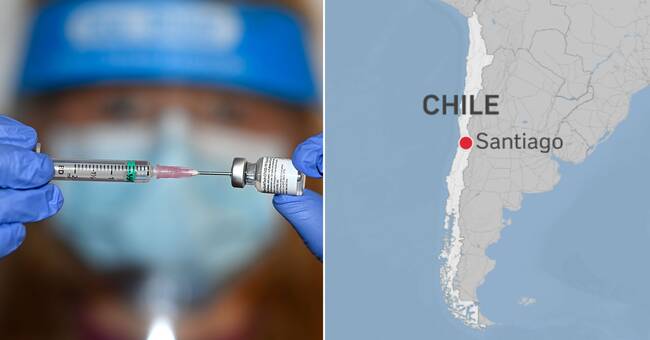Following rapid and widespread vaccination, the number of covid-19 deaths in the United Kingdom and the United States has declined rapidly.
Even in Sweden, the vaccine strategy seems to lead to a noticeable reduction in deaths.
But there are countries where vaccinations have not yet received the same response.
In Hungary, Chile and Uruguay, the numbers of deaths have remained high, despite long-term vaccination.
On April 21, Hungary had among the highest death toll in the world with 23.7 deaths per million inhabitants, based on the average number of confirmed deaths in the last seven days.
In Uruguay the average was 17.6 dead and in Chile 6 according to the statistics site Our world in data.
It can be compared with 2.1 in the USA, 0.4 in the UK and 2.3 in Sweden.
- If you do as in Sweden, to vaccinate those who risk ending up in hospital and die first, then you will reduce the death toll.
But if you vaccinate healthcare staff first, or to slow down the spread in society, you do not see the same effect on the death toll, says Matti Sällberg.
Chile: Three percent effective after a dose
Common to the three countries is that a large part of the vaccination took place with the Chinese Sinovac, a vaccine whose effectiveness has been disputed.
In Chile, where over 40 percent of the population has received at least one dose, the vast majority of doses have been from Sinovac.
A study at the Universidad de Chile showed that the Chinese vaccine had an efficacy rate of 56 percent after two doses - and only 3 percent after one dose.
- The Chinese vaccine is a little slower to get the immune system going.
During a pandemic, you want the immune system to start as soon as possible.
If you look at the mRNA and virus vector vaccine, they seem to provide 50% protection already after a dose, says Sällberg.
Recognizes the low level of protection itself
The fact that the vaccine takes longer to create antibodies, at the same time as restrictions in the countries have begun to ease and people have subsequently relaxed, is seen by several experts as a reason for the rising curves.
Earlier in April, for the first time, China acknowledged the shortcomings of the vaccine's effectiveness.
But Matti Sällberg is still convinced that the vaccine will be useful in the fight against the virus.
- The technology is well-proven, you can give it as many times as you like and boost the immune system.
We will probably need to vaccinate the world population again and again over the next three to four years and that means we will need all the vaccines that are approved, he says.

